Have you ever heard someone say, "Play music for your plants—it helps them grow"? It sounds like something out of a fairy tale, but surprisingly, this idea has some roots in science.
Whether you're a seasoned gardener or someone who just wants their windowsill basil to thrive, this topic might change how you think about your green friends.
So, let's dive in: Can plants really "hear"? And can music or sound truly make a difference in how they grow?
Plants Don't Have Ears — But That's Not the Whole Story
Obviously, plants don't have ears or brains like animals. They can't hear music the way we do. But that doesn't mean they're completely unaware of sound.
Plants are sensitive to their environment in many ways. They respond to light, gravity, touch, and even vibrations in the air and soil. Sound is, after all, a kind of vibration—a wave of energy that moves through a medium like air or water.
Several scientists now believe that plants can "sense" sound vibrations in their own unique way, using specialized cells or structures.
What the Research Shows
In recent years, multiple experiments have tested the effects of sound on plant growth. A famous study during the 1960s found that certain classical music appeared to enhance the growth of balsam plants. Other plants exposed to music grew faster and developed bigger leaves compared to plants that were kept in silence.
More modern experiments have supported this idea. In 2007, researchers at the National Institute of Agricultural Biotechnology in South Korea found that rice plants exposed to classical music activated specific genes related to growth and development.
In 2014, a study published in Trends in Plant Science suggested that plants might use tiny structures called mechanoreceptors to detect vibrations in their surroundings. These receptors allow them to "sense" things like wind, touch, and possibly even sound.
Different Sounds, Different Effects?
Not all sounds are created equal when it comes to plants. Some studies show that classical music or soft instrumental sounds tend to have the most positive effects. On the other hand, loud noises or harsh sounds (like heavy traffic or rock music) may actually cause stress-like reactions in plants.
Researchers believe the frequency and rhythm of sound waves may play a role. For example:
• Low-frequency sounds (100–500 Hz) are more likely to promote root growth
• Higher frequencies may encourage leaf development or flowering
• Constant loud noise can reduce germination rates or damage sensitive plants
So, just like people, plants might prefer a calm and peaceful environment to thrive.
How Plants React to Sound
When exposed to sound, some plants show subtle but measurable changes:
• Faster growth in height and root length
• More chlorophyll production, which helps in photosynthesis
• Stronger stems and larger leaves
Some researchers even suggest that certain plants can "lean toward" or grow in the direction of the sound source, just like they do with sunlight. This movement may be their way of seeking positive vibrations.
Can Music Protect Plants from Harm?
Interestingly, sound might do more than just help plants grow—it could also protect them. A 2019 study found that plants can respond to the sound of a bee buzzing nearby by increasing the amount of sugar in their nectar. This makes them more attractive to pollinators, which helps them reproduce.
Other researchers are experimenting with sound-based pest control. Certain frequencies might repel harmful insects or prevent fungal infections, providing a natural alternative to chemicals.
Practical Tips for Plant Lovers
If you're curious to try sound or music with your own plants, here are some simple tips:
• Choose soft instrumental or classical music with a gentle rhythm
• Play it at a moderate volume (not too loud!)
• Set a schedule—1 to 3 hours per day is enough
• Experiment with different types of sound and track how your plant responds
Just remember: while music can be a fun and possibly helpful tool, the basics of sunlight, water, and soil are still the most important factors for plant health.
What Experts Say
Dr. Monica Gagliano, an evolutionary ecologist and author of Thus Spoke the Plant, has done groundbreaking work in the field of plant bioacoustics. She explains that plants are "capable of sensing sound in meaningful ways," and may even use vibrations to communicate with each other or detect threats.
While some of these ideas are still controversial in mainstream science, there's growing interest in understanding plants as more aware and responsive than we once thought.
So, Can Plants Really "Hear"?
While plants don't "hear" in the human sense, they do respond to sound vibrations, and these responses can influence their growth and health. Whether it's through improved nutrient absorption, stress resistance, or simply faster growth, music might indeed be a secret ingredient for happier houseplants.


